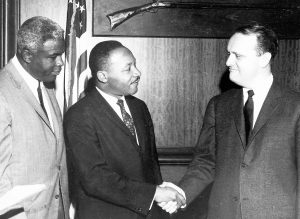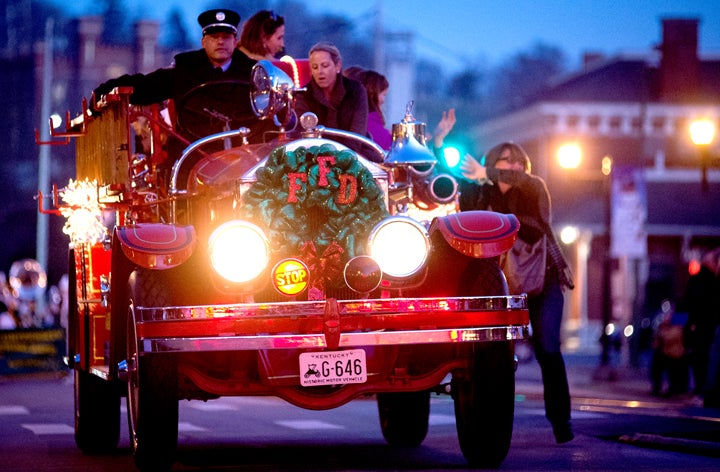By Roger Barlow
Thursday, March 5, 1964, began as a typical Kentucky day, but it was also atypical in that it was the day of the march on Frankfort. At its end, the seeds of justice had been planted, and with the warmth of solidarity, the march would eventually sprout the Kentucky Civil Rights Act of 1966.
Let us back up for a moment by stating a simple fact: the news of today becomes the history of tomorrow. Sometimes, history happens one slow step at a time — one foot in front of the other.

Jackie Robinson and Dr. Martin Luther King Jr. meet with Gov. Edward T. “Ned” Breathitt March 5, 1964, at the Capitol. (Photo courtesy the Kentucky Historical Society)
No matter our age, we all share a common thread: we are all witness to history in our own unique way. Many times, we judge historic events by where we were on a precise day. Examples include the day JFK was assassinated, the Space Shuttle Challenger disaster and the events of Sept. 11, 2001. But sometimes a historic event may be a culmination of many smaller happenings.
March 5, 1964, was one of those happenings — a day of many that led to one of the most major events of the 20th century — the Civil Rights Movement.
The March on Frankfort was a monumental effort, organized in part, by future Senator Georgia Davis Powers, the powerhouse of Kentucky equality. In 1968, Powers herself made history by becoming the first female and person of color elected to the Kentucky Senate.
The historic call to March on Frankfort was answered by the Rev. Dr. Martin Luther King Jr., Jackie Robinson, noted for breaking the color barrier in Major League Baseball, and folk group Peter, Paul and Mary, the troubadours of social activism.
Over 10,000 others joined the effort to come to Kentucky, deliver a petition to Gov. Edward T. “Ned” Breathitt, and walk for something many of us now take for granted — equal rights in public accommodation. The soil of segregation affected hotels, restaurants and other establishments.
Most appropriately, as the marchers neared the Capitol, Peter, Paul and Mary were singing Bob Dylan’s epic song of social activism and wisdom, “Blowin’ in the Wind.”
It wasn’t the first time Dr. King had been to Frankfort. He was the 1957 commencement speaker at Kentucky State College, now Kentucky State University. However, the 1964 march was not merely to speak in front of enthusiastic graduates and proud parents. It was for thousands of Americans to come together and march to the Capitol in a message of solidarity.

Souvenir Program of the March on Frankfort. (Photo courtesy the Kentucky Historical Society)
Gov. Breathitt was in his office, but chose to not personally address the crowd or accept the petition for equal accommodations. Undeterred, a delegation led by Dr. King, Robinson, Powers and others, to include Rev. K.L. Moore of the First Baptist Church of Frankfort, hand-delivered the petition to his office and discussed the bill before the legislature.
That year, the bill did not pass the legislature, however, Breathitt proudly signed the Kentucky Civil Rights Act into law on Jan. 27, 1966, with Kentucky becoming the first southern state to do so.
In many ways, the fight for equal rights continues. When Thomas Jefferson wrote that all men are created equal, he gave credence to the idea that maybe we aren’t so different after all. We must remember that even with the torrential rains of injustice, it is possible for a rainbow to follow.
One day hopefully we will put aside our collective prejudices, realize that we are all in this world together, with the same hopes and dreams — and that truly the answer is just “blowing in the wind.”










